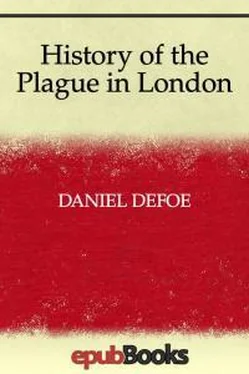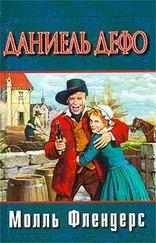Даниэль Дефо - History of the Plague in London
Здесь есть возможность читать онлайн «Даниэль Дефо - History of the Plague in London» весь текст электронной книги совершенно бесплатно (целиком полную версию без сокращений). В некоторых случаях можно слушать аудио, скачать через торрент в формате fb2 и присутствует краткое содержание. Год выпуска: 2014, Издательство: epubBooks Classics, Жанр: Историческая проза, на английском языке. Описание произведения, (предисловие) а так же отзывы посетителей доступны на портале библиотеки ЛибКат.
- Название:History of the Plague in London
- Автор:
- Издательство:epubBooks Classics
- Жанр:
- Год:2014
- ISBN:нет данных
- Рейтинг книги:4 / 5. Голосов: 1
-
Избранное:Добавить в избранное
- Отзывы:
-
Ваша оценка:
- 80
- 1
- 2
- 3
- 4
- 5
History of the Plague in London: краткое содержание, описание и аннотация
Предлагаем к чтению аннотацию, описание, краткое содержание или предисловие (зависит от того, что написал сам автор книги «History of the Plague in London»). Если вы не нашли необходимую информацию о книге — напишите в комментариях, мы постараемся отыскать её.
History of the Plague in London — читать онлайн бесплатно полную книгу (весь текст) целиком
Ниже представлен текст книги, разбитый по страницам. Система сохранения места последней прочитанной страницы, позволяет с удобством читать онлайн бесплатно книгу «History of the Plague in London», без необходимости каждый раз заново искать на чём Вы остановились. Поставьте закладку, и сможете в любой момент перейти на страницу, на которой закончили чтение.
Интервал:
Закладка:
As they fled now out of the city, so I should observe that the court [36] Charles II. and his courtiers. The immunity of Oxford was doubtless due to good drainage and general cleanliness.
removed early, viz., in the month of June, and went to Oxford, where it pleased God to preserve them; and the distemper did not, as I heard of, so much as touch them; for which I cannot say that I ever saw they showed any great token of thankfulness, and hardly anything of reformation, though they did not want being told that their crying vices might, without breach of charity, be said to have gone far in bringing that terrible judgment upon the whole nation.
The face of London was now, indeed, strangely altered: I mean the whole mass of buildings, city, liberties, suburbs, Westminster, Southwark, and altogether; for as to the particular part called the city, or within the walls, that was not yet much infected. But in the whole, the face of things, I say, was much altered. Sorrow and sadness sat upon every face, and though some part were not yet overwhelmed, yet all looked deeply concerned; and as we saw it apparently coming on, so every one looked on himself and his family as in the utmost danger. Were it possible to represent those times exactly to those that did not see them, and give the reader due ideas of the horror that everywhere presented itself, it must make just impressions upon their minds, and fill them with surprise. London might well be said to be all in tears. The mourners did not go about the streets, [37] Eccl. xii. 5.
indeed; for nobody put on black, or made a formal dress of mourning for their nearest friends: but the voice of mourning was truly heard in the streets. The shrieks of women and children at the windows and doors of their houses, where their nearest relations were perhaps dying, or just dead, were so frequent to be heard as we passed the streets, that it was enough to pierce the stoutest heart in the world to hear them. Tears and lamentations were seen almost in every house, especially in the first part of the visitation; for towards the latter end, men's hearts were hardened, and death was so always before their eyes that they did not so much concern themselves for the loss of their friends, expecting that themselves should be summoned the next hour.
Business led me out sometimes to the other end of the town, even when the sickness was chiefly there. And as the thing was new to me, as well as to everybody else, it was a most surprising thing to see those streets, which were usually so thronged, now grown desolate, and so few people to be seen in them, that if I had been a stranger, and at a loss for my way, I might sometimes have gone the length of a whole street, I mean of the by–streets, and see [38] Have seen.
nobody to direct me, except watchmen set at the doors of such houses as were shut up; of which I shall speak presently.
One day, being at that part of the town on some special business, curiosity led me to observe things more than usually; and indeed I walked a great way where I had no business. I went up Holborn, and there the street was full of people; but they walked in the middle of the great street, neither on one side or [39] Nor. This misuse of "or" for "nor" is frequent with Defoe.
other, because, as I suppose, they would not mingle with anybody that came out of houses, or meet with smells and scents from houses, that might be infected.
The inns of court were all shut up, nor were very many of the lawyers in the Temple, [40] The four inns of court in London which have the exclusive right of calling to the bar, are the Inner Temple, the Middle Temple, Lincoln's Inn, and Gray's Inn. The Temple is so called because it was once the home of the Knights Templars.
or Lincoln's Inn, or Gray's Inn, to be seen there. Everybody was at peace, there was no occasion for lawyers; besides, it being in the time of the vacation too, they were generally gone into the country. Whole rows of houses in some places were shut close up, the inhabitants all fled, and only a watchman or two left.
When I speak of rows of houses being shut up, I do not mean shut up by the magistrates, but that great numbers of persons followed the court, by the necessity of their employments, and other dependencies; and as others retired, really frighted with the distemper, it was a mere desolating of some of the streets. But the fright was not yet near so great in the city, abstractedly so called, [41] The city proper, i.e., the part within the walls, as distinguished from that without.
and particularly because, though they were at first in a most inexpressible consternation, yet, as I have observed that the distemper intermitted often at first, so they were, as it were, alarmed and unalarmed again, and this several times, till it began to be familiar to them; and that even when it appeared violent, yet seeing it did not presently spread into the city, or the east or south parts, the people began to take courage, and to be, as I may say, a little hardened. It is true, a vast many people fled, as I have observed; yet they were chiefly from the west end of the town, and from that we call the heart of the city, that is to say, among the wealthiest of the people, and such persons as were unincumbered with trades and business. But of the rest, the generality staid, and seemed to abide the worst; so that in the place we call the liberties, and in the suburbs, in Southwark, and in the east part, such as Wapping, Ratcliff, Stepney, Rotherhithe, and the like, the people generally staid, except here and there a few wealthy families, who, as above, did not depend upon their business.
It must not be forgot here that the city and suburbs were prodigiously full of people at the time of this visitation, I mean at the time that it began. For though I have lived to see a further increase, and mighty throngs of people settling in London, more than ever; yet we had always a notion that numbers of people which—the wars being over, the armies disbanded, and the royal family and the monarchy being restored—had flocked to London to settle in business, or to depend upon and attend the court for rewards of services, preferments, and the like, was [42] Were.
such that the town was computed to have in it above a hundred thousand people more than ever it held before. Nay, some took upon them to say it had twice as many, because all the ruined families of the royal party flocked hither, all the soldiers set up trades here, and abundance of families settled here. Again: the court brought with it a great flux of pride and new fashions; all people were gay and luxurious, and the joy of the restoration had brought a vast many families to London. [43] The population of London at this time was probably about half a million. It is now about six millions. (See Macaulay's History, chap. iii.)
But I must go back again to the beginning of this surprising time. While the fears of the people were young, they were increased strangely by several odd accidents, which put altogether, it was really a wonder the whole body of the people did not rise as one man, and abandon their dwellings, leaving the place as a space of ground designed by Heaven for an Aceldama, [44] Acel´dama, the field of blood (see Matt. xxvii. 8).
doomed to be destroyed from the face of the earth, and that all that would be found in it would perish with it. I shall name but a few of these things; but sure they were so many, and so many wizards and cunning people propagating them, that I have often wondered there was any (women especially) left behind.
In the first place, a blazing star or comet appeared for several months before the plague, as there did, the year after, another a little before the fire. The old women, and the phlegmatic hypochondriac [45] Phlegmatic hypochondriac is a contradiction in terms; for "phlegmatic" means "impassive, self–restrained," while "hypochondriac" means "morbidly anxious" (about one's health). Defoe's lack of scholarship was a common jest among his more learned adversaries, such as Swift, and Pope.
part of the other sex (whom I could almost call old women too), remarked, especially afterward, though not till both those judgments were over, that those two comets passed directly over the city, and that so very near the houses that it was plain they imported something peculiar to the city alone; that the comet before the pestilence was of a faint, dull, languid color, and its motion very heavy, solemn, and slow, but that the comet before the fire was bright and sparkling, or, as others said, flaming, and its motion swift and furious; and that, accordingly, one foretold a heavy judgment, slow but severe, terrible, and frightful, as was the plague, but the other foretold a stroke, sudden, swift, and fiery, as was the conflagration. Nay, so particular some people were, that, as they looked upon that comet preceding the fire, they fancied that they not only saw it pass swiftly and fiercely, and could perceive the motion with their eye, but even they heard it; that it made a rushing, mighty noise, fierce and terrible, though at a distance, and but just perceivable.
Интервал:
Закладка:
Похожие книги на «History of the Plague in London»
Представляем Вашему вниманию похожие книги на «History of the Plague in London» списком для выбора. Мы отобрали схожую по названию и смыслу литературу в надежде предоставить читателям больше вариантов отыскать новые, интересные, ещё непрочитанные произведения.
Обсуждение, отзывы о книге «History of the Plague in London» и просто собственные мнения читателей. Оставьте ваши комментарии, напишите, что Вы думаете о произведении, его смысле или главных героях. Укажите что конкретно понравилось, а что нет, и почему Вы так считаете.












